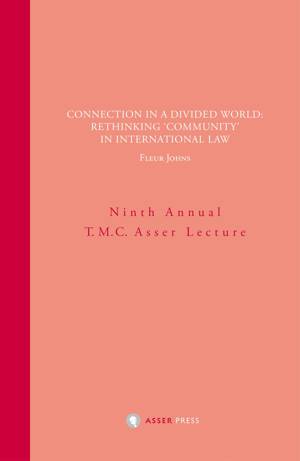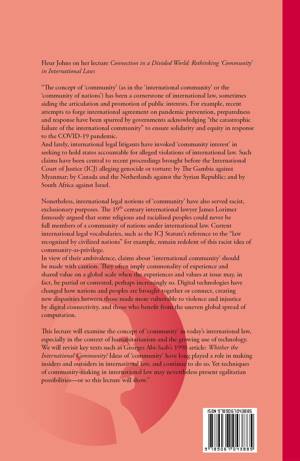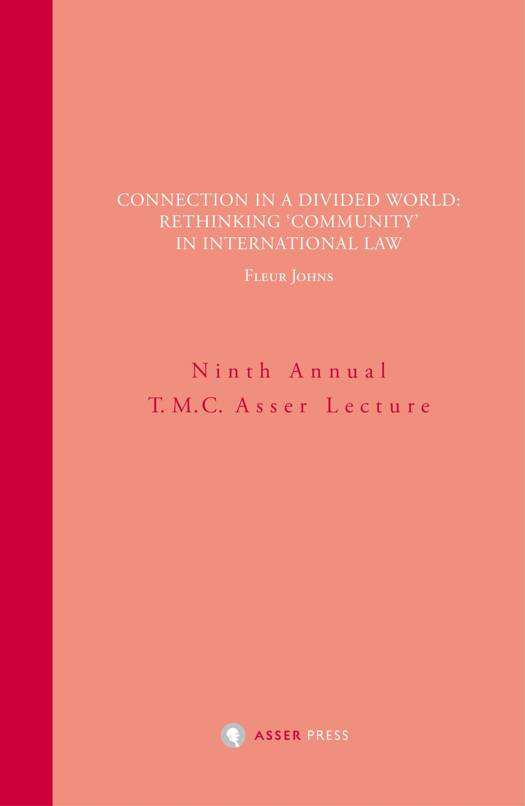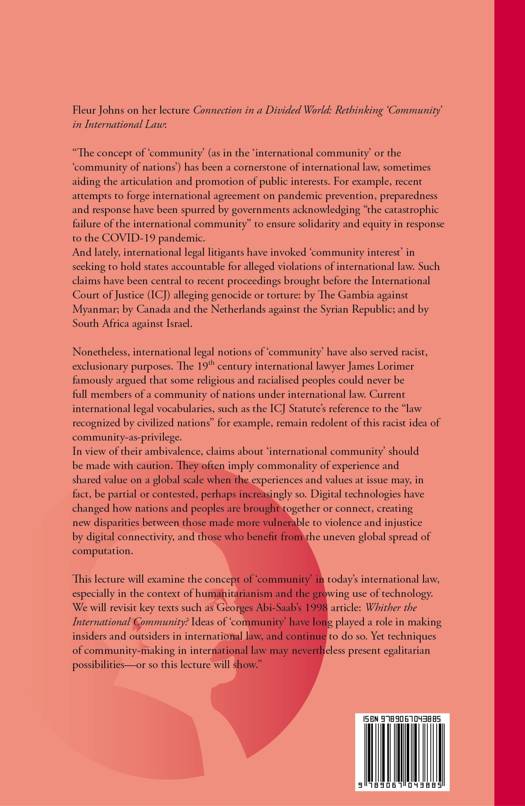
- Retrait gratuit dans votre magasin Club
- 7.000.000 titres dans notre catalogue
- Payer en toute sécurité
- Toujours un magasin près de chez vous
- Retrait gratuit dans votre magasin Club
- 7.000.0000 titres dans notre catalogue
- Payer en toute sécurité
- Toujours un magasin près de chez vous


Connection in a Divided World: Rethinking ‘Community’ in International Law
Ninth Annual T.M.C. Asser Lecture
Fleur Johns
10,00 €
+ 20 points
Description
Fleur Johns on her lecture 'Connection in a Divided World: Rethinking ‘Community’ in International Law':
“The concept of ‘community’ (as in the ‘international community’ or the ‘community of nations’) has been a cornerstone of international law, sometimes aiding the articulation and promotion of public interests. For example, recent attempts to forge international agreement on pandemic prevention, preparedness and response have been spurred by governments acknowledging ‘the catastrophic failure of the international community’ to ensure solidarity and equity in response to the COVID-19 pandemic.
And lately, international legal litigants have invoked ‘community interest’ in seeking to hold states accountable for alleged violations of international law. Such claims have been central to recent proceedings brought before the International Court of Justice (ICJ) alleging genocide or torture: by The Gambia against Myanmar; by Canada and the Netherlands against the Syrian Republic; and by South Africa against Israel.
Nonetheless, international legal notions of ‘community’ have also served racist, exclusionary purposes. The 19th century international lawyer James Lorimer famously argued that some religious and racialised peoples could never be full members of a community of nations under international law. Current international legal vocabularies, such as the ICJ Statute’s reference to the “law recognized by civilized nations” for example, remain redolent of this racist idea of community-as-privilege.
In view of their ambivalence, claims about ‘international community’ should be made with caution. They often imply commonality of experience and shared value on a global scale when the experiences and values at issue may, in fact, be partial or contested, perhaps increasingly so. Digital technologies have changed how nations and peoples are brought together or connect, creating new disparities between those made more vulnerable to violence and injustice by digital connectivity, and those who benefit from the uneven global spread of computation.
This lecture will examine the concept of ‘community’ in today's international law, especially in the context of humanitarianism and the growing use of technology. We will revisit key texts such as Georges Abi-Saab's 1998 article: 'Whither the International Community?' Ideas of ‘community’ have long played a role in making insiders and outsiders in international law, and continue to do so. Yet techniques of community-making in international law may nevertheless present egalitarian possibilities—or so this lecture will show.”
“The concept of ‘community’ (as in the ‘international community’ or the ‘community of nations’) has been a cornerstone of international law, sometimes aiding the articulation and promotion of public interests. For example, recent attempts to forge international agreement on pandemic prevention, preparedness and response have been spurred by governments acknowledging ‘the catastrophic failure of the international community’ to ensure solidarity and equity in response to the COVID-19 pandemic.
And lately, international legal litigants have invoked ‘community interest’ in seeking to hold states accountable for alleged violations of international law. Such claims have been central to recent proceedings brought before the International Court of Justice (ICJ) alleging genocide or torture: by The Gambia against Myanmar; by Canada and the Netherlands against the Syrian Republic; and by South Africa against Israel.
Nonetheless, international legal notions of ‘community’ have also served racist, exclusionary purposes. The 19th century international lawyer James Lorimer famously argued that some religious and racialised peoples could never be full members of a community of nations under international law. Current international legal vocabularies, such as the ICJ Statute’s reference to the “law recognized by civilized nations” for example, remain redolent of this racist idea of community-as-privilege.
In view of their ambivalence, claims about ‘international community’ should be made with caution. They often imply commonality of experience and shared value on a global scale when the experiences and values at issue may, in fact, be partial or contested, perhaps increasingly so. Digital technologies have changed how nations and peoples are brought together or connect, creating new disparities between those made more vulnerable to violence and injustice by digital connectivity, and those who benefit from the uneven global spread of computation.
This lecture will examine the concept of ‘community’ in today's international law, especially in the context of humanitarianism and the growing use of technology. We will revisit key texts such as Georges Abi-Saab's 1998 article: 'Whither the International Community?' Ideas of ‘community’ have long played a role in making insiders and outsiders in international law, and continue to do so. Yet techniques of community-making in international law may nevertheless present egalitarian possibilities—or so this lecture will show.”
Spécifications
Parties prenantes
- Auteur(s) :
- Editeur:
Contenu
- Nombre de pages :
- 68
- Langue:
- Anglais
- Collection :
Caractéristiques
- EAN:
- 9789067043885
- Date de parution :
- 20-08-24
- Format:
- Livre broché
- Dimensions :
- 150 mm x 230 mm
- Poids :
- 166 g

Les avis
Nous publions uniquement les avis qui respectent les conditions requises. Consultez nos conditions pour les avis.







